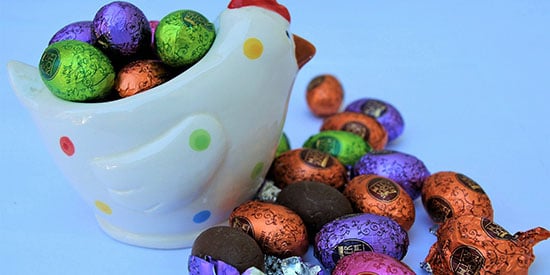Blame evolution if you're overdoing the Easter eggs: Deakin experts
Media release
As Easter approaches and the yearning for chocolate increases accordingly, taste experts from Deakin's Centre for Advanced Sensory Science (CASS) say there's a scientific reason behind why we love the sugary treats so much.
CASS Director Professor Russell Keast said chocolate met the 'quinella of bliss' - just the right combination of sugar and fat.
"Sugar activates sweet taste which is satisfying and drives consumption, while fat is high in energy and increases chocolate's eating pleasure with ideal melting mouthfeel characteristics that consumers really appreciate," Professor Keast said.
"There's no naturally occurring food that combines fats and sugars; there is no chocolate tree. So in evolutionary terms our brains are going, 'wow, fantastic, consume more'.
"The combination of these things leads to a strong positive liking for chocolate, and even if we eat too much and start to feel ill, we easily forget this feeling, and the next time we have a chance to overindulge, we do it again."
Professor Keast said humans learnt to avoid foods that made them feel sick, but chocolate was different.
"We can overcome the short term overconsumption that makes us feel ill, because the high energy density is received positively by the body - so you just remember the joy of consumption," he said.
"Some studies have further demonstrated that sugar activates the opioid and dopaminergic reward centres in the brain. I am not sure the extent we can call sugar addictive, but maybe for some people it is mildly addictive in this way.
"Then you add cultural factors on top of that. If that context is positive, the food often becomes special and positive. Chocolate plays an important role in many celebrations across the globe, especially at Easter."
CASS colleague Dr Gie Liem has written several academic papers on chocolate taste. He said the flavour mainly came from cocoa solids, but exactly how that developed was still not completely understood.
"Chocolate, like wine, starts with differing plant varieties and growing conditions and then requires elaborate processing to achieve the final product," he said.
"The two basic tastants that dominate chocolate - among a wide variety of other flavours - are sweet and bitter.
"Most chocolate contains a considerable amount of sugar, with milk chocolate being approximately 45 per cent sugar and dark chocolate going from 0 to 45 per cent, depending on brand and type."
Dr Liem said our taste for darker, bitter chocolate usually grew as we aged.
"A dislike for bitter taste is actually rather functional, because many toxic foods in nature taste bitter," he said.
"So children in general dislike bitter notes in foods, while adults learn to enjoy some bitter foods such as coffee, alcohol or dark chocolate. This is likely to be related to repeated exposure and the positive post-ingestive consequences of these foods. We feel good after we eat them."
Dr Liem said there was some evidence supporting the idea that dark chocolate was a healthier choice, not because it contains less calories, but simply because we tend to eat less of it.
"The intense flavour of bitter chocolate and the usually harder texture causes us to stop sooner than if we were to eat milk chocolate," he said.
"It's been shown that people feel more satisfied or full, and feel less desire to eat something sweet, fatty or savoury, after they consume dark chocolate compared to milk chocolate."
Although Dr Liem said dark chocolate was far from a health food.
"There are lots of myths regarding antioxidants and the good stuff in chocolate. You need to eat a very large amount of chocolate to have any (if any) benefit from the antioxidants in it," he said.
"If you eat this much chocolate, you better be worried about the amount of calories you consume."
But Professor Keast said it was okay to give into chocolate cravings every now and then.
"Studies assessing self‐reported cravings consistently find chocolate among the most craved food items," he said.
"And other studies show the deprivation of chocolate flavour leads to an increase in consumption post‐deprivation.
"So self-confessed chocoholics may benefit from practicing moderation rather than outright denial due to the susceptibility to binge in response to a chocolate ban. A good mantra to live by is everything in moderation."

